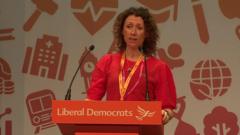Will the Lib Dems Allow Trans Women in Diversity Quotas?

Published: 2025-09-20 19:45:17 | Category: sport
This year’s Liberal Democrat annual conference saw a significant debate concerning the inclusion of trans women in diversity quotas, which was ultimately blocked by party members. The proposed motion aimed to redefine the criteria for these quotas based on biological sex, but it faced strong opposition from within the party, emphasising the ongoing tensions around gender identity and representation.
Last updated: 25 October 2023 (BST)
Key Takeaways
- The motion to exclude trans women from women’s diversity quotas failed during the Liberal Democrat conference.
- Opposition highlighted the importance of recognising trans identities and the potential harm of debating their validity.
- The discussion reflects wider societal debates surrounding gender identity and women's rights.
- Key party figures abstained from the vote, citing prior commitments.
- Free speech concerns were raised amidst accusations of censorship.
The Context of the Motion
At the heart of the matter is a motion proposed by Dr Zoe Hollowood, a prominent member of the campaign group Liberal Democrat Voice for Women. She called for a debate on whether trans women should be included in the party's diversity quotas aimed at increasing women's representation. This proposal gained traction following a Supreme Court ruling that suggested a woman could be defined strictly by biological sex.
Dr Hollowood argued that the inclusion of trans women in these quotas undermines the representation of biological women, stating, "Returning males into vacancies expressly reserved for females would be unlawful." Her stance reflects a growing concern among some women’s rights activists about the implications of gender self-identification on female spaces and opportunities.
Opposition to the Motion
Opposition to Dr Hollowood’s proposal was vigorous, spearheaded by Lucas North, treasurer of the LGBT+ Liberal Democrats. He labelled the motion a "sham" and urged attendees to reject what he termed "transphobic views". North argued that the motion misrepresented current legal standards and contradicted the party’s commitment to supporting LGBT+ rights.
His plea resonated with the conference attendees, leading to a decisive two-to-one vote against the motion. This opposition underscores the party's commitment to inclusivity and diversity, as well as a rejection of the notion that trans identities should be subject to debate.
Party Members' Responses
The reaction within the conference was mixed. While Dr Hollowood urged members to engage in meaningful debate, she faced vocal dissent. Many attendees reacted negatively to her comments regarding free speech, particularly her reference to the arrest of Graham Linehan, a critic of the trans rights movement. This reference was met with shouts from the audience, demonstrating the heightened emotions surrounding this issue.
Dr Hollowood’s arguments centred on the belief that free speech is under threat in the UK, particularly regarding discussions on gender identity. She asserted that silencing opposing views could lead to greater societal issues, including censorship and a lack of open dialogue. However, many at the conference felt that her motion could legitimise harmful perspectives and undermine the party's long-standing support for trans rights.
The Party’s Position on Diversity Quotas
The Liberal Democrats have long championed diversity and inclusion. The party currently has a separate quota for trans identities, which highlights their commitment to recognising and supporting the rights of all gender identities. This existing framework was a significant point of contention in the debate, as Dr Hollowood argued for a reevaluation based on biological definitions.
Lisa Smart, the party's home affairs spokeswoman, later commented on the procedural motion that led to the removal of Dr Hollowood's proposal. She indicated that the decision was ultimately in the hands of party members, suggesting a democratic process at play, albeit one that reflects the complexities of the current political climate surrounding gender and identity.
Implications of the Debate
The outcome of this debate highlights broader societal tensions regarding gender identity, women's rights, and the evolving nature of language and representation in politics. The Liberal Democrats find themselves at a crossroads, balancing the need for inclusivity with the concerns of some female members who feel their voices are being overshadowed.
This incident is indicative of a larger conversation occurring across various political landscapes in the UK and beyond. As societal norms shift, so too does the language and legislation surrounding gender and identity. The Liberal Democrats, by engaging in this debate, are not just addressing internal party policy but are also reflecting and shaping the national discourse on these issues.
What Happens Next?
The rejection of Dr Hollowood's motion does not signify an end to the discussion surrounding gender identity and women's representation within the Liberal Democrats. Instead, it opens the door for continued dialogue and potential policy reviews as the party navigates these complex issues. Moving forward, the challenge will be to create an environment where both women’s rights and trans rights can coexist without marginalising either group.
As society continues to grapple with these questions, the Liberal Democrats will need to balance diverse perspectives within their membership while remaining true to their values of equality and representation. The outcome of this debate may influence not only party policy but also the wider political landscape as the UK faces ongoing discussions about gender and identity.
FAQs
What was the main argument for excluding trans women from diversity quotas?
The main argument centred on the belief that trans women are biological men, and therefore their inclusion in women’s diversity quotas undermines the representation of biological women, as stated by Dr Zoe Hollowood.
Who opposed the motion to exclude trans women from diversity quotas?
The motion was opposed by Lucas North, treasurer of LGBT+ Liberal Democrats, who argued that it misrepresented the legal position and contradicted the party’s longstanding support of LGBT+ rights.
What was the outcome of the vote at the Liberal Democrat conference?
The motion to debate and potentially vote on excluding trans women from diversity quotas was blocked, with a vote of two-to-one against it.
How did the party's MPs react during the debate?
Many of the Liberal Democrat MPs left the hall during the debate, which led to their absence from the vote. A party spokeswoman stated that they had to attend their daily morning meeting.
What concerns did Dr Hollowood raise about free speech?
Dr Hollowood expressed concerns that free speech is under pressure in the UK and argued that suppressing opposing views could lead to censorship and a lack of open dialogue.
As discussions around gender identity and rights continue to evolve, how will political parties adapt their policies to reflect the complexities of modern society? #LiberalDemocrats #TransRights #WomensRights



